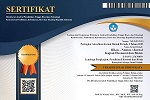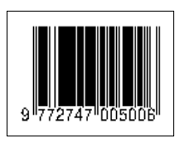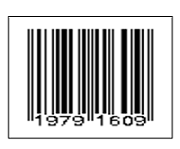- Focus and Scope
- Section Policies
- Peer Review Process
- Publication Frequency
- Publication Ethics
- Plagiarism Policy
- Author Fees
Focus and Scope
Artikel yang dimuat Meliputi Kajian Tentang Perekonomian Makro Serta Kajian Akuntansi dan Manajemen.
Section Policies
Artikel
Peer Review Process
Oikos Nomos menerbitkan artikel mengikuti panduan dan template yang sudah disediakan. Semua manuskrip yang dikirim akan melalui proses peer-review double-blind, durasi peninjauan adalah antara 2-4 minggu. Pra-review naskah dilakukan oleh tim editorial untuk meninjau kesesuaian teks dengan fokus dan ruang lingkup dan gaya jurnal dan pedoman penulisan. Naskah akan dikirim ke pengulas berdasarkan bidang spesialisasi mereka. Peninjau memberikan penilaian naskah yang mencakup orisinalitas, kontribusi ilmiah, dan kejelasan presentasi. Berdasarkan komentar dan saran dari pengulas dewan editorial membuat keputusan atas komentar dan saran pengulas. Jurnal ini memiliki empat jenis kriteria keputusan termasuk: diterima, diterima dengan sedikit revisi, diterima dengan banyak revisi, dan ditolak. Pemeriksaan plagiarisme dilakukan dengan menggunakan Pemeriksa Plagiarisme Online. Batas indikasi untuk plagiarisme yang ditetapkan adalah maksimum 10%.
Publication Frequency
June and December
Publication Ethics
Oikos Nomos: Kajian Jurnal Ekonomi dan Bisnis is a peer-reviewed journal published by Economic Faculty, Universitas Negeri Gorontalo. This journal is available in print and online and highly respects the publication ethic and avoids any type of plagiarism. This statement explains the ethical behavior of all parties involved in the act of publishing an article in this journal, including the author, the editor in chief, the editorial board, the peer-reviewers and the publisher (Economic Faculty, State University of Gorontalo). This statement is based on COPE’s Best Practice Guidelines for Journal Editors. Ethical Guideline for Journal Publication The publication of an article in a peer-reviewed journal of Oikos Nomos is an essential building block in the development of a coherent and respected network of knowledge. It is a direct reflection of the quality of the work of the authors and the institutions that support them. Peer-reviewed articles support and embody the scientific method. It is therefore important to agree upon standards of expected ethical behavior for all parties involved in the act of publishing: the author, the journal editor, the peer reviewer, the publisher and the society. Economic Faculty, State University of Gorontalo as publisher of Oikos Nomos takes its duties of guardianship over all stages of publishing seriously and we recognize our ethical behavior and other responsibilities. We are committed to ensuring that advertising, reprint or other commercial revenue has no impact or influence on editorial decisions. In addition, the Economic Faculty, State University of Gorontalo and Editorial Board will assist in communications with other journals and/or publishers where this is useful and necessary. Publication decisions The editor of the Oikos Nomos: Kajian Jurnal Ekonomi dan Bisnis is responsible for deciding which of the articles submitted to the journal should be published. The validation of the work in question and its importance to researchers and readers must always drive such decisions. The editors may be guided by the policies of the journal's editorial board and constrained by such legal requirements as shall then be in force regarding libel, copyright infringement and plagiarism. The editors may confer with other editors or reviewers in making this decision. Fair play The editor at any time evaluate manuscripts for their intellectual content without regard to race, gender, sexual orientation, religious belief, ethnic origin, citizenship, or political philosophy of the authors. Confidentiality The editor and any editorial staff must not disclose any information about a submitted manuscript to anyone other than the corresponding author, reviewers, potential reviewers, other editorial advisers, and the publisher, as appropriate. Disclosure and conflicts of interest Unpublished materials disclosed in a submitted manuscript must not be used in an editor's own research without the express written consent of the author. Duties of Reviewers Contribution to Editorial Decisions. Peer review assists the editor in making editorial decisions and through the editorial communications with the author may also assist the author in improving the paper. Promptness. Any selected referee who feels unqualified to review the research reported in a manuscript or knows that its prompt review will be impossible should notify the editor and excuse himself from the review process. Confidentiality. Any manuscripts received for review must be treated as confidential documents. They must not be shown to or discussed with others except as authorized by the editor. Standards of Objectivity. Reviews should be conducted objectively. Personal criticism of the author is inappropriate. Referees should express their views clearly with supporting arguments. Acknowledgement of Sources. Reviewers should identify relevant published work that has not been cited by the authors. Any statement that an observation, derivation, or argument had been previously reported should be accompanied by the relevant citation. A reviewer should also call to the editor's attention any substantial similarity or overlap between the manuscript under consideration and any other published paper of which they have personal knowledge. Disclosure and Conflict of Interest. Privileged information or ideas obtained through peer review must be kept confidential and not used for personal advantage. Reviewers should not consider manuscripts in which they have conflicts of interest resulting from competitive, collaborative, or other relationships or connections with any of the authors, companies, or institutions connected to the papers. Duties of Authors Reporting standards. Authors of reports of original research should present an accurate account of the work performed as well as an objective discussion of its significance. Underlying data should be represented accurately in the paper. A paper should contain sufficient detail and references to permit others to replicate the work. Fraudulent or knowingly inaccurate statements constitute unethical behaviour and are unacceptable. Data Access and Retention. Authors are asked to provide the raw data in connection with a paper for editorial review, and should be prepared to provide public access to such data (consistent with the ALPSP-STM Statement on Data and Databases), if practicable, and should in any event be prepared to retain such data for a reasonable time after publication. Originality and Plagiarism. The authors should ensure that they have written entirely original works, and if the authors have used the work and/or words of others that this has been appropriately cited or quoted. Multiple, Redundant or Concurrent Publication. An author should not in general publish manuscripts describing essentially the same research in more than one journal or primary publication. Submitting the same manuscript to more than one journal concurrently constitutes unethical publishing behaviour and is unacceptable. Acknowledgement of Sources. Proper acknowledgment of the work of others must always be given. Authors should cite publications that have been influential in determining the nature of the reported work. Authorship of the Paper. Authorship should be limited to those who have made a significant contribution to the conception, design, execution, or interpretation of the reported study. All those who have made significant contributions should be listed as co-authors. Where there are others who have participated in certain substantive aspects of the research project, they should be acknowledged or listed as contributors. The corresponding author should ensure that all appropriate co-authors and no inappropriate co-authors are included on the paper, and that all co-authors have seen and approved the final version of the paper and have agreed to its submission for publication. Disclosure and Conflicts of Interest. All authors should disclose in their manuscript any financial or other substantive conflict of interest that might be construed to influence the results or interpretation of their manuscript. All sources of financial support for the project should be disclosed. Fundamental errors in published works. When an author discovers a significant error or inaccuracy in his/her own published work, it is the author’s obligation to promptly notify the journal editor or publisher and cooperate with the editor to retract or correct the paper. _______________________________________________________________________________________ Editor-in-Chief, Oikos Nomos: Kajian Jurnal Ekonomi dan Bisnis
Plagiarism Policy
Oikos-Nomos : Jurnal Kajian Ekonomi dan Bisnis Editorial board recognizes that plagiarism is not acceptable and therefore establisbes the following policy stating specific actions (pinalties) upon identification of plagiarism/similarities in articles submitted for publication in OIKOS NOMOS. OIKOS NOMOS will use Turnitin's originality checing sofware as the tool in detecting similarities of texts in article manuscripts and the final version of articles ready for publication. A maximum of 10% of the similarities iindex, the article will be returned to the autor for correction and re-submission. Definition: Plagiarism involves the "use or close imitation of the language and thougths of another author and the representation of them as one's own original work". Policy: Papers must be original, unpublished, and not pending publication elsewhere. Any material taken verbatim from another source needs to be clearly identified as different from the present original text by (1) indentation, (2) use of quotation marks, and (3) identification of the source. Any text of an amount exceeding fair use standards (herein defined as more than two or three sentences or the equivalent thereof) or any graphic material reproduced from another source requires permission from the copyright holder and, if feasible, the original author(s) and also requires identification of the source; e.g., previous publication. When plagiarism is identified, the Editor in Chief responsible for the review of this paper and will agree on measures according to the extent of plagiarism detected in the paper in agreement with the following guidelines: Level of Plagiarism Minor Plagiarism A small sentence or short paragraph of another manuscript is plagiarized without any significant data or ideas taken from the other papers or publications. Punishment: A warning is given to the authors and a request to change the manuscript and properly cite the original sources. Intermediate Plagiarism A significant data, paragraph, or sentence of an article is plagiarized without proper citation to the original source. Punishment: The submitted article is automatically rejected. Severe Plagiarism A large portion of an article is plagiarized that involves many aspects such as reproducing original results (data, formulation, equation, law, statement, etc.), ideas, and methods presented in other publications. Punishment: The paper is automatically rejected and the authors are forbidden to submit further articles to the journal.
Author Fees
This journal charges the following author fees.
Article Submission: 0.00 (IDR)
Authors are required to pay an Article Submission Fee as part of the submission process to contribute to review costs.
Article Publication: 500000.00 (IDR)
If this paper is accepted for publication, you will be asked to pay an Article Publication Fee to cover publications costs.
If you do not have funds to pay such fees, you will have an opportunity to waive each fee. We do not want fees to prevent the publication of worthy work.


1.png)








